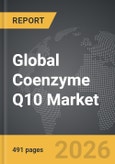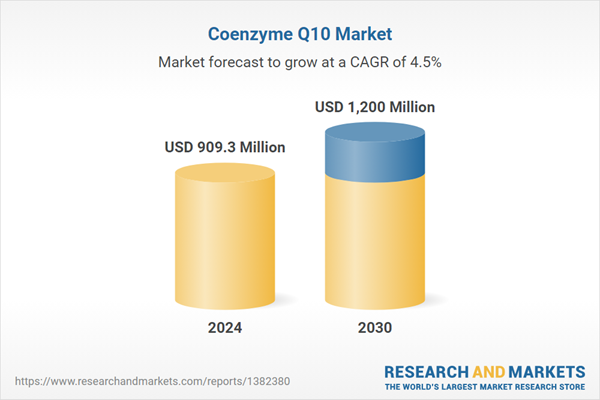Coenzyme Q10 - Key Trends and Drivers
Coenzyme Q10 (CoQ10), also known as ubiquinone, is a naturally occurring antioxidant found in the mitochondria of cells, where it plays a crucial role in the production of energy. CoQ10 assists in the conversion of food into adenosine triphosphate (ATP), the molecule that provides energy for cellular processes. This compound is present in various foods, including meat, fish, and whole grains, and is also synthesized by the body. However, the body’ s production of CoQ10 decreases with age, and certain medical conditions and medications, particularly statins used to lower cholesterol, can further reduce its levels. This has led to a growing interest in CoQ10 supplementation. CoQ10 supplements are commonly used to support cardiovascular health, boost energy levels, and mitigate the side effects of statin drugs, which can deplete the body's natural CoQ10 levels. Additionally, CoQ10 is gaining attention for its potential to reduce oxidative stress and improve conditions such as migraines, fibromyalgia, and neurodegenerative diseases.Recent scientific research has significantly expanded the understanding of CoQ10’ s health benefits and applications. Numerous studies have demonstrated its efficacy in improving heart function in individuals with congestive heart failure, a condition where the heart struggles to pump blood efficiently. CoQ10 supplementation has been shown to reduce the frequency and severity of migraines, providing relief for sufferers of this debilitating condition. For athletes and individuals with chronic fatigue syndrome, CoQ10 enhances physical performance and reduces fatigue by supporting cellular energy production. The antioxidant properties of CoQ10 are also beneficial in slowing the progression of neurodegenerative diseases like Parkinson’ s and Alzheimer’ s, where oxidative stress plays a critical role. Furthermore, advancements in supplement formulation technology have improved the bioavailability of CoQ10, making it more effective. Various forms, such as ubiquinol (the reduced and more readily absorbed form of CoQ10) and water-soluble formulations, have been developed to enhance absorption, ensuring that the body can utilize CoQ10 more efficiently.
The growth in the Coenzyme Q10 market is driven by several factors. Increasing consumer awareness about the extensive health benefits of CoQ10, particularly for cardiovascular health and energy enhancement, is a significant driver. As the global population ages, the prevalence of CoQ10 deficiency is expected to rise, further boosting the demand for supplements. Technological advancements in supplement formulation, such as the development of more bioavailable forms of CoQ10, are making these supplements more effective and accessible, thereby propelling market growth. Additionally, the widespread use of statins and the associated need to counteract their side effects with CoQ10 supplementation are major contributors to market demand. The expanding application of CoQ10 in cosmetic products, driven by its anti-aging properties, is opening new avenues for market growth, as consumers increasingly seek products that can mitigate the visible signs of aging. Moreover, the growing focus on preventive healthcare and the rising trend of self-medication and dietary supplements are driving the adoption of CoQ10 supplements. These factors, combined with the ongoing research and increasing consumer interest in maintaining health and wellness, underscore the robust expansion of the CoQ10 market, highlighting its growing importance in modern health and wellness regimes.
Report Scope
The report analyzes the Coenzyme Q10 market, presented in terms of market value. The analysis covers the key segments and geographic regions outlined below.- Segments: Application (Dietary Supplements, Pharmaceuticals, Cosmetics).
- Geographic Regions/Countries: World; United States; Canada; Japan; China; Europe (France; Germany; Italy; United Kingdom; and Rest of Europe); Asia-Pacific; Rest of World.
Key Insights:
- Market Growth: Understand the significant growth trajectory of the Dietary Supplements Application segment, which is expected to reach US$609.1 Million by 2030 with a CAGR of a 3.9%. The Pharmaceuticals Application segment is also set to grow at 5.5% CAGR over the analysis period.
- Regional Analysis: Gain insights into the U.S. market, valued at $243.9 Million in 2024, and China, forecasted to grow at an impressive 4.3% CAGR to reach $187.6 Million by 2030. Discover growth trends in other key regions, including Japan, Canada, Germany, and the Asia-Pacific.
Why You Should Buy This Report:
- Detailed Market Analysis: Access a thorough analysis of the Global Coenzyme Q10 Market, covering all major geographic regions and market segments.
- Competitive Insights: Get an overview of the competitive landscape, including the market presence of major players across different geographies.
- Future Trends and Drivers: Understand the key trends and drivers shaping the future of the Global Coenzyme Q10 Market.
- Actionable Insights: Benefit from actionable insights that can help you identify new revenue opportunities and make strategic business decisions.
Key Questions Answered:
- How is the Global Coenzyme Q10 Market expected to evolve by 2030?
- What are the main drivers and restraints affecting the market?
- Which market segments will grow the most over the forecast period?
- How will market shares for different regions and segments change by 2030?
- Who are the leading players in the market, and what are their prospects?
Report Features:
- Comprehensive Market Data: Independent analysis of annual sales and market forecasts in US$ Million from 2024 to 2030.
- In-Depth Regional Analysis: Detailed insights into key markets, including the U.S., China, Japan, Canada, Europe, Asia-Pacific, Latin America, Middle East, and Africa.
- Company Profiles: Coverage of players such as Arla Foods Ingredients Group P/S, Carbery Food Ingredients, Cargill Inc., Dairy Farmers of America Inc., Davisco Foods International Inc. and more.
- Complimentary Updates: Receive free report updates for one year to keep you informed of the latest market developments.
Some of the 78 companies featured in this Coenzyme Q10 market report include:
- ABCR GmbH & Co., KG.
- Beiersdorf AG
- Creative Enzymes
- Jinan Qinmu Fine Chemical Co., Ltd.
- Kaneka Corporation
- KAVYA PHARMA
- Kuraray Co., Ltd.
- MainChem Co., Ltd.
- Maypro Industries
- Mitsubishi Gas Chemical Co., Inc.
This edition integrates the latest global trade and economic shifts into comprehensive market analysis. Key updates include:
- Tariff and Trade Impact: Insights into global tariff negotiations across 180+ countries, with analysis of supply chain turbulence, sourcing disruptions, and geographic realignment. Special focus on 2025 as a pivotal year for trade tensions, including updated perspectives on the Trump-era tariffs.
- Adjusted Forecasts and Analytics: Revised global and regional market forecasts through 2030, incorporating tariff effects, economic uncertainty, and structural changes in globalization. Includes historical analysis from 2015 to 2023.
- Strategic Market Dynamics: Evaluation of revised market prospects, regional outlooks, and key economic indicators such as population and urbanization trends.
- Innovation & Technology Trends: Latest developments in product and process innovation, emerging technologies, and key industry drivers shaping the competitive landscape.
- Competitive Intelligence: Updated global market share estimates for 2025, competitive positioning of major players (Strong/Active/Niche/Trivial), and refined focus on leading global brands and core players.
- Expert Insight & Commentary: Strategic analysis from economists, trade experts, and domain specialists to contextualize market shifts and identify emerging opportunities.
Table of Contents
Companies Mentioned (Partial List)
A selection of companies mentioned in this report includes, but is not limited to:
- ABCR GmbH & Co., KG.
- Beiersdorf AG
- Creative Enzymes
- Jinan Qinmu Fine Chemical Co., Ltd.
- Kaneka Corporation
- KAVYA PHARMA
- Kuraray Co., Ltd.
- MainChem Co., Ltd.
- Maypro Industries
- Mitsubishi Gas Chemical Co., Inc.
Table Information
| Report Attribute | Details |
|---|---|
| No. of Pages | 491 |
| Published | February 2026 |
| Forecast Period | 2024 - 2030 |
| Estimated Market Value ( USD | $ 909.3 Million |
| Forecasted Market Value ( USD | $ 1200 Million |
| Compound Annual Growth Rate | 4.5% |
| Regions Covered | Global |









